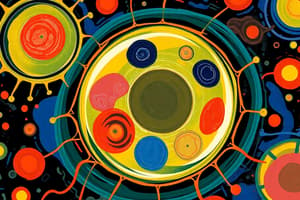Podcast
Questions and Answers
Which cell organelle is often called the 'powerhouse' of the cell?
Which cell organelle is often called the 'powerhouse' of the cell?
- Lysosomes
- Nucleus
- Endoplasmic Reticulum
- Mitochondria (correct)
What is the primary function of the cell membrane?
What is the primary function of the cell membrane?
- Waste Disposal
- Protein Synthesis
- Energy Production
- Boundary and Transport (correct)
Where is the genetic material of the cell stored?
Where is the genetic material of the cell stored?
- Cell Membrane
- Mitochondria
- Nucleus (correct)
- Lysosomes
Which organelle is responsible for protein synthesis in the cell?
Which organelle is responsible for protein synthesis in the cell?
What is the function of lysosomes in a cell?
What is the function of lysosomes in a cell?
Which organelle contains enzymes and proteins needed to convert nutrients into ATP?
Which organelle contains enzymes and proteins needed to convert nutrients into ATP?
What is the main role of the endoplasmic reticulum in a cell?
What is the main role of the endoplasmic reticulum in a cell?
Which type of endoplasmic reticulum is responsible for synthesizing proteins?
Which type of endoplasmic reticulum is responsible for synthesizing proteins?
What is the main function of lysosomes in a cell?
What is the main function of lysosomes in a cell?
Which organelle is involved in the synthesis of lipids and detoxification processes?
Which organelle is involved in the synthesis of lipids and detoxification processes?
What is the primary purpose of lysosomes breaking down molecules in a cell?
What is the primary purpose of lysosomes breaking down molecules in a cell?
What is the network of flattened, membrane-bound sacs and tubules found within a cell's cytoplasm?
What is the network of flattened, membrane-bound sacs and tubules found within a cell's cytoplasm?
Flashcards are hidden until you start studying
Study Notes
Exploring Cell Components and Their Functions
At the heart of all living organisms, cells serve as the fundamental units responsible for life's processes. To better understand these processes, let's delve into the functional roles of several essential cell parts.
Nucleus: Genetic Material Storage
The nucleus is a distinctive, rounded organelle found within the cell's cytoplasm. It contains the cell's genetic material, called DNA, which is organized into structures called chromosomes. The nucleus' primary role is to store and regulate genetic information, allowing cells to reproduce accurately and produce proteins based on the instructions encoded in the DNA.
Mitochondria: Energy Production
Mitochondria are often referred to as the "powerhouses" of the cell because they are responsible for generating ATP (adenosine triphosphate), the cell's primary energy currency. Mitochondria contain a double-membrane structure that houses enzymes and proteins required to convert nutrients into ATP through a process called cellular respiration.
Cell Membrane: Boundary and Transport
The cell membrane, also known as the plasma membrane, is an essential component of the cell, serving as a barrier between the inside and outside of the cell. This bilayer composed of lipids and proteins acts as a selectively permeable membrane, allowing specific molecules and ions to pass through while preventing others from entering or exiting the cell. This selectivity is crucial for maintaining the cell's internal environment, preventing waste accumulation, and controlling the flow of nutrients.
Endoplasmic Reticulum: Protein Synthesis
The endoplasmic reticulum (ER) is a network of flattened, membrane-bound sacs and tubules found within the cell's cytoplasm. The ER plays a vital role in protein synthesis, folding, and modification. It is divided into two main types – rough ER, which is studded with ribosomes responsible for synthesizing proteins, and smooth ER, which is involved in the synthesis of lipids and detoxification processes.
Lysosomes: Waste Disposal
Lysosomes are membrane-bound organelles filled with digestive enzymes and hydrolytic acid. These enzymes break down various molecules, including dead organelles, cellular debris, and invading pathogens, converting them into simpler compounds that can be used by the cell or expelled outside. Lysosomes are crucial for maintaining cellular homeostasis and eliminating waste products.
These cell components and their functions are essential for the survival and proper functioning of living organisms. Understanding their roles and interactions will help us better grasp the complex processes that govern life at the molecular level.
Studying That Suits You
Use AI to generate personalized quizzes and flashcards to suit your learning preferences.




